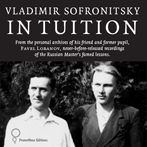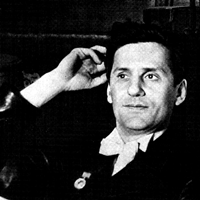

- EDITION003 Details
- EDITION003 Reviews
- EDITION003 Artist
SOFRONITSKY In Tuition
SCRIABIN Preludes Op.11/4*^ & 5*, Op.13/6, Op.22/1^ & 3^;
Mazurka Op.25/3^; Poème Op.32/1*; Sonata No.9;
Debussy Reflets dans l'eau; LISZT Etude de Concert S.144/2 La leggierezza;
MENDELSSOHN Etude Op. 104/3; SCHUMANN Carnaval.
Vladimir Sofronitsky
Recorded 1947-54 | Time 79:57 | Cover Photo by Pavel Lobanov
SCRIABIN Preludes Op.11/4*^ & 5*, Op.13/6, Op.22/1^ & 3^;
Mazurka Op.25/3^; Poème Op.32/1*; Sonata No.9;
Debussy Reflets dans l'eau; LISZT Etude de Concert S.144/2 La leggierezza;
MENDELSSOHN Etude Op. 104/3; SCHUMANN Carnaval.
Vladimir Sofronitsky
Recorded 1947-54 | Time 79:57 | Cover Photo by Pavel Lobanov

This CD brings over twenty-five minutes of Sofronitsky's teaching of three of Scriabin’s pieces* as well as performances of four Scriabin pieces^, all recorded privately at his Moscow apartment in 1954. The lessons are meticulously indexed with carefully labelled translations in the booklet. There's also a selection of private and live recordings from 1947 and 1954 of works by Scriabin, Schumann, Liszt, Debussy and Mendelssohn.
Sample tracks:
click on ? for info
click on ? for info
Bryce Morrison, Gramophone October 2002
A fascinating glimpse into the teaching methods of a Russian master pianist
This touching disc is issued in memory of Vladimir Sofronitsky (1901-61), the legendary Russian pianist whose artistry was greatly admired by the likes of Richter, Gilels, Horowitz and Neuhaus. Produced by Yuri Paterson-Olenich, part of whose previously issued Scriabin recital appears on a bonus record, the sound ranges from the barely adequate to the execrable while still allowing something of Sofronitsky’s charisma, the fascination he held for so many musicians, to shine through.
You can hear him teaching two of his students – notably Pavel Lobanov, who first offered these tapes for issue – coaxing and cajoling them towards greater simplicity, begging for both calm and freedom. Certainly, listening to his own playing, you are more aware that for him stiffness and inhibition were among the cardinal crimes. In Schumann’s Carnaval, ‘Eusebius’ is grandly rather than intimately inflected. ‘Sphinxes’ is humorously included while in ‘Paganini’ confusion reigns before it is abruptly terminated. An interpolation in Liszt’s ‘La leggierezza’ surely occurs more by accident than design and the opening of Debussy’s ‘Reflets dans l’eau’ is sufficiently downright to suggest that Sofronitsky had lost patience with the composer’s dream world at the outset. Again, in Chopin’s First Scherzo it is a case of anything goes, with Sofronitsky’s dys-synchronisations and rhythmic changes offered very much as the mood takes him.
Yet if character frequently topples into caricature, Sofronitsky’s spontaneity and vitality can be enchanting; never more so than in the final section of ‘Promenade’ from Carnaval where Schumann leaves his dancing magic and glides into reverie. Sofronitsky’s reading of Scriabin’s Ninth Sonata is also of a special character and distinction.
These performances and lessons were recorded ‘on amateur equipment in domestic conditions’ and they hardly bear out Lobanov’s claim that Sofronitsky surpassed Cortot in profundity and dramatic intensity. But, supplemented by Philips’ Great pianists of the 20th Century Sofronitsky release (of Chopin and Scriabin), they still make for compelling listening.
David Fanning, Grampohone February 2003
From the same pianistic stable as Dimitry Shostakovich and Mariya Yudina, son-in-law of Scriabin and often hailed as that composer’s unrivalled interpreter, Sofronitsky was reportedly cited by his contemporaries and younger followers as an almost god-like figure. What if he had been able to tour in the West and make studio recordings there? Now at least we have a tantalising glimpse of his mind at work, as Prometheus Editions has given us a selection of private and previously unpublished recordings , including a startlingly variable Schumann Carnaval from 1947, and , most trasurably of all, three lessons in which Sofronitsky takes his pupils step-by-step through Scriabin miniatures.
Anyone looking for the secret of his magical powers may be disappointed at his insistence of calm, flow and suppleness, on total self-awareness and discipline. But these are, after all, lessons directed at the adept pupil, not master-classes grandstanding for an audience. And in any case, at least part of the secret is disclosed, if indirectly: it’s precisely the uncompromising self-discipline that brings the expressive urge into focus and communicates something beyond the individual ego. The urge and the ego are taken for granted; artistry has to be painstakingly constructed. As BM noted, the sound "the sound ranges from the barely adequate to the execrable while still allowing something of Sofronitsky’s charisma… to shine through".
Michael Dervan, Irish Times 29th August 2002
The still little-known Russian pianist Vladimir Sofronitsky (1901-1961), son-in-law of Scriabin (whom he never actually met or heard perform), is widely respected in expert circles as a Scriabin interpreter without peer. This enterprising CD brings over 25 minutes of Sofronitsky's teaching of three of his idol's pieces, recorded privately at his Moscow apartment in 1954. The recording is primitive, but his points are all clearly caught, usually reinforced by demonstrations, and his unclichéing of his pupils' playing is meticulously indexed with carefully labelled translations in the booklet. There's also a selection of private and live recordings from 1947 and 1954 (Scriabin, including the Ninth Sonata, Schumann's Carnaval, plus some Liszt, Debussy and Mendelssohn) in sound quality that will test anyone's tolerance. Thoroughly fascinating, but sample before you buy.
A fascinating glimpse into the teaching methods of a Russian master pianist
This touching disc is issued in memory of Vladimir Sofronitsky (1901-61), the legendary Russian pianist whose artistry was greatly admired by the likes of Richter, Gilels, Horowitz and Neuhaus. Produced by Yuri Paterson-Olenich, part of whose previously issued Scriabin recital appears on a bonus record, the sound ranges from the barely adequate to the execrable while still allowing something of Sofronitsky’s charisma, the fascination he held for so many musicians, to shine through.
You can hear him teaching two of his students – notably Pavel Lobanov, who first offered these tapes for issue – coaxing and cajoling them towards greater simplicity, begging for both calm and freedom. Certainly, listening to his own playing, you are more aware that for him stiffness and inhibition were among the cardinal crimes. In Schumann’s Carnaval, ‘Eusebius’ is grandly rather than intimately inflected. ‘Sphinxes’ is humorously included while in ‘Paganini’ confusion reigns before it is abruptly terminated. An interpolation in Liszt’s ‘La leggierezza’ surely occurs more by accident than design and the opening of Debussy’s ‘Reflets dans l’eau’ is sufficiently downright to suggest that Sofronitsky had lost patience with the composer’s dream world at the outset. Again, in Chopin’s First Scherzo it is a case of anything goes, with Sofronitsky’s dys-synchronisations and rhythmic changes offered very much as the mood takes him.
Yet if character frequently topples into caricature, Sofronitsky’s spontaneity and vitality can be enchanting; never more so than in the final section of ‘Promenade’ from Carnaval where Schumann leaves his dancing magic and glides into reverie. Sofronitsky’s reading of Scriabin’s Ninth Sonata is also of a special character and distinction.
These performances and lessons were recorded ‘on amateur equipment in domestic conditions’ and they hardly bear out Lobanov’s claim that Sofronitsky surpassed Cortot in profundity and dramatic intensity. But, supplemented by Philips’ Great pianists of the 20th Century Sofronitsky release (of Chopin and Scriabin), they still make for compelling listening.
David Fanning, Grampohone February 2003
From the same pianistic stable as Dimitry Shostakovich and Mariya Yudina, son-in-law of Scriabin and often hailed as that composer’s unrivalled interpreter, Sofronitsky was reportedly cited by his contemporaries and younger followers as an almost god-like figure. What if he had been able to tour in the West and make studio recordings there? Now at least we have a tantalising glimpse of his mind at work, as Prometheus Editions has given us a selection of private and previously unpublished recordings , including a startlingly variable Schumann Carnaval from 1947, and , most trasurably of all, three lessons in which Sofronitsky takes his pupils step-by-step through Scriabin miniatures.
Anyone looking for the secret of his magical powers may be disappointed at his insistence of calm, flow and suppleness, on total self-awareness and discipline. But these are, after all, lessons directed at the adept pupil, not master-classes grandstanding for an audience. And in any case, at least part of the secret is disclosed, if indirectly: it’s precisely the uncompromising self-discipline that brings the expressive urge into focus and communicates something beyond the individual ego. The urge and the ego are taken for granted; artistry has to be painstakingly constructed. As BM noted, the sound "the sound ranges from the barely adequate to the execrable while still allowing something of Sofronitsky’s charisma… to shine through".
Michael Dervan, Irish Times 29th August 2002
The still little-known Russian pianist Vladimir Sofronitsky (1901-1961), son-in-law of Scriabin (whom he never actually met or heard perform), is widely respected in expert circles as a Scriabin interpreter without peer. This enterprising CD brings over 25 minutes of Sofronitsky's teaching of three of his idol's pieces, recorded privately at his Moscow apartment in 1954. The recording is primitive, but his points are all clearly caught, usually reinforced by demonstrations, and his unclichéing of his pupils' playing is meticulously indexed with carefully labelled translations in the booklet. There's also a selection of private and live recordings from 1947 and 1954 (Scriabin, including the Ninth Sonata, Schumann's Carnaval, plus some Liszt, Debussy and Mendelssohn) in sound quality that will test anyone's tolerance. Thoroughly fascinating, but sample before you buy.

Vladimir Horowitz listened with great attention to Sofronitsky’s opinion of his playing. While he was at the Alexander Scriabin Museum in 1986, Horowitz reminisced upon Sofronitsky’s remarks about his performances of Scriabin’s ninth and tenth sonatas: “Sofronitsky I remember did not like the way I played the ninth sonata. He said, ‘You didn’t understand, but the tenth you played like nobody else.’ That is what he said to me . . . He was very strict.”
Heinrich Neuhaus wrote in his Reminiscences of Sofronitsky: “I know few pianists who, over the decades, have so deeply interested me, awoken so many feelings and thoughts . . . Any one of Sofronitsky’s concerts took place invariably in an overcrowded hall to the warmest and sincerest ovations of the auditorium . . . Such meetings with art, with “the genius of beauty” [referring to Pushkin] belong to the rarest, the finest that it is possible to experience in life.”
Sviatoslav Richter in his notebooks said: "A giant of a man who played Schumann and Debussy magnificently and Scriabin like nobody else."
